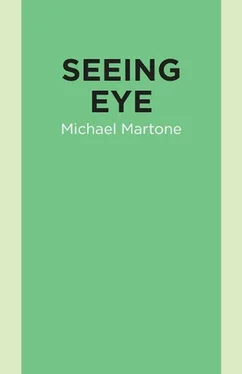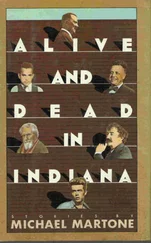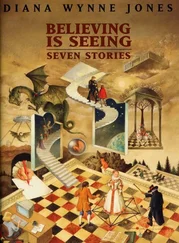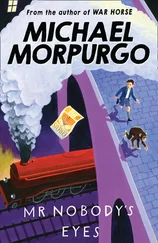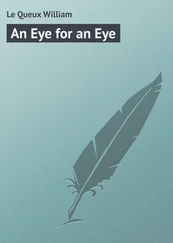Michael Martone - Seeing Eye
Здесь есть возможность читать онлайн «Michael Martone - Seeing Eye» весь текст электронной книги совершенно бесплатно (целиком полную версию без сокращений). В некоторых случаях можно слушать аудио, скачать через торрент в формате fb2 и присутствует краткое содержание. Год выпуска: 2013, Издательство: Dzanc Books, Жанр: Современная проза, на английском языке. Описание произведения, (предисловие) а так же отзывы посетителей доступны на портале библиотеки ЛибКат.
- Название:Seeing Eye
- Автор:
- Издательство:Dzanc Books
- Жанр:
- Год:2013
- ISBN:нет данных
- Рейтинг книги:5 / 5. Голосов: 1
-
Избранное:Добавить в избранное
- Отзывы:
-
Ваша оценка:
- 100
- 1
- 2
- 3
- 4
- 5
Seeing Eye: краткое содержание, описание и аннотация
Предлагаем к чтению аннотацию, описание, краткое содержание или предисловие (зависит от того, что написал сам автор книги «Seeing Eye»). Если вы не нашли необходимую информацию о книге — напишите в комментариях, мы постараемся отыскать её.
Seeing Eye — читать онлайн бесплатно полную книгу (весь текст) целиком
Ниже представлен текст книги, разбитый по страницам. Система сохранения места последней прочитанной страницы, позволяет с удобством читать онлайн бесплатно книгу «Seeing Eye», без необходимости каждый раз заново искать на чём Вы остановились. Поставьте закладку, и сможете в любой момент перейти на страницу, на которой закончили чтение.
Интервал:
Закладка:
On the State of the Union
The Speaker bangs the gavel for order. The gavel is a gift to the United States from the people of India, the largest democracy to the world’s oldest. Order.
I’m standing in front of my swivel chair next to the Speaker. I’m the President of the Senate. At the beginning of his speech the President of the United States will call me Mr. President.
The party members are still on their feet. Some are whistling, fingers stretching lips, like fans at a basketball game. The red light bounces from camera to camera around the house. The Majority are settling in, looking before they sit, picking up the text that has been distributed to their seats. Some are riffling through its pages. Others are shouting into their neighbors’ ears while they continue to applaud routinely. Order.
The gavel is made of pale marble and ivory fitted with brass trim. The Speaker rests his weight on his knuckles, the gavel’s handle squeezed in one fist. He looks like my father, his chin lowered, looking out at the House through his bushy brow. It makes me want to do something bad, and the boys in our party on the floor start up again after the Speaker has introduced the President just as much to see that stern mask set deeper on the Speaker’s Neanderthal face as to cheer the President on.
I watch the red light on the cameras as it goes off and on around the room. I try to guess where it will alight next. The one in the lobby doorway. The one fixed on the mezzanine wall. The one behind the Speaker that shows the fanned seating of the floor. The angle that captures the various Secretaries and Generals and Ambassadors. I never know when the camera will focus on me. I am looking thoughtful, I think, as I applaud. The light flickers on the camera aimed at the wives in the gallery above. I follow the vector from that camera, its lens slowly extending for a tight close-up on the First Lady, who stands by the railing in the blue dress with big buttons, pearls bubbling at her throat, her eyes glassy, as always, applauding effortlessly. I see her over the President’s right shoulder, smoothing her skirt around her hips as she sits down. And we all sit down.
Her husband begins to speak, and I remind myself to count the number of times he will be interrupted by applause. I know the words that are cues. The Whips have briefed us in caucus. There are plants salted in the gallery to trigger responses. The pauses are scripted. I always tell myself that I will keep track of the applause to match the number with the talking heads at the networks. But I lose track. My thoughts flit away from me like that light that now burns on the camera in the center aisle below us suddenly extinguishing itself and suddenly flaring up again after completing a circuit of the room during an interlude of cheering.
They’ve been working on the President. I can see the line of Pan-Cake on his neck where the napkin masked his white collar. Color has been brushed on the cheek he turns toward me when his head scans the room. His hair is freshly dyed, the television lights polishing the contours, each strand lacquered into place.
I know what people are thinking. They see me brooding behind the President. I have touched up my own temples with a hint of gray. It is important that we all forget about the President’s mortality. I alone am allowed to age. I imagine the Members on the floor squirming in their seats, adjusting their angles of vision, using the bulk of the President to blot me and then the thought of me out of their minds. The President’s most recent collapse, captured on television, has brought me back into their thoughts that now are drifting away from the prepared text, the paragraph on infrastructure they have been following halfheartedly, and into that percentage of every minute each has allotted to daydream, fantasy, or prayer. I walk in the corridors of some skulls out there. The possibility of me. The blue-eyed, bushy-tailed fact of me.
To get back at them, I employ the old Toastmaster trick of imagining the audience naked, and they sit there like dollops of frosting, their famous gray heads collapsing into puddles of fat that fill the seats. The esteemed colleague from Rhode Island is a smear of freckles. There, Howie has a rash that itches. I see secret tattoos. Trickles of sweat deliberately trace the topography of Teddy’s sagging breast. The thighs, worn smooth, shiny, and white by a life dedicated to always wearing trousers, straddle the shriveled assortment of penises, the Members’ members, that now are listening to their owners’ own state of the union, a message of hope and resurrection punctuated by a worn catalog of past and very private images. Order. Order.
Up on the toes of their naked feet, cheering, their flesh jiggles and sways, breaks out in splotches of color. Bill’s thighs have been stripped of veins for his bypass. The gentleman from New Jersey has new plugs. They are otherwise unremarkable, marked only for the death they have convinced themselves for now does not exist for them. The cancer ticks in a chest, a strangled heart, a brain that forgets to remember. There is another nakedness beneath the twill layer of beige skin. And it is, perhaps, only accessible to me from my strange vantage on this dais looking out at them all. I see into them. My job description gives me this vision since all I do is wait on death. I am the official mourner. The shadow of death cast a few polite paces behind the aging President.
Above us all, the First Lady, also naked, her face framed by an aurora of hair, rises from her seat and continues to rise to hover near the ceiling. A gesture of etched lines divides her body into hemispheres of breasts and belly and clefts of her butt, a kind of ancient statue, veined marble and ivory. She cleaves apart suddenly. The parts whirling into a system of orbiting planets. The President looks up at the glowing constellation of his wife.
The President’s speech continues. All of it has already been distributed. It is being delivered as if by a machine. I witness the essential part of him leave himself for a moment, shedding the shell of his suit, to float up above the august chamber of the House of Representatives, joining the animated and precious flesh of his wife.
I think such thoughts because the President thinks such thoughts. Much of what we do is fantasy. It is my job to dream his dreams. In case he is unable to complete his constitutional duties, I am ready to step into his place.
I chair, at the pleasure of the President, a commission on space. I see in his dark suit the deep black fabric of the universe. There are still flakes of white dandruff on the shoulders and back. I stare into the depths between those flecks of white transforming into twinkling stars. It is a map of heavenly bodies. This vacuum has a texture. I lose my way in its blackness. I no longer hear the speech. On television, I will appear lost in grave thought. I have forgotten the spontaneous applause. The infinite silence between those stars terrifies me.
On the Tomb of the Unknown Soldier
Who were these soldiers? The hairless living ones who helped me place the wreath at the Tomb of the Unknown Soldier. One of them was black. One was white. But what I saw of what was left of their faces (the glossy brims of their caps squashed down on their noses and the straps hid the lips outlining the metallic exterior jaws) were identical grim expressions made up of the least expressive parts, the plane geometry of their cheeks and chins. Their hands were gloved and gripped the green florist’s wire stand that connected them as if it ran out of their palms and extruded through their squeezing fingers. Their skeletons must have been made of the same pinched wire running through the clay. When they moved, they moved only the moving part. Marching, the legs didn’t disturb the head or torso. When they lifted the flowers, their hands alone snatched them up. Their wrists ratcheted to a predetermined calibration in the joints. A pause and then their heads snapped forward together, leaving their bodies still facing the wreath they held motionless between them. Another pause, then their left legs stepped toward the tomb, Egyptian, the mechanism of the hips hidden beneath the flare of their blue belted jackets. The air reeked of carnations and roses and mothballs that had steeped their wool uniforms. I followed them conscious of the wobble in my limbs, my wrinkled suit, my puckered face, my hair blowing into my eyes.
Читать дальшеИнтервал:
Закладка:
Похожие книги на «Seeing Eye»
Представляем Вашему вниманию похожие книги на «Seeing Eye» списком для выбора. Мы отобрали схожую по названию и смыслу литературу в надежде предоставить читателям больше вариантов отыскать новые, интересные, ещё непрочитанные произведения.
Обсуждение, отзывы о книге «Seeing Eye» и просто собственные мнения читателей. Оставьте ваши комментарии, напишите, что Вы думаете о произведении, его смысле или главных героях. Укажите что конкретно понравилось, а что нет, и почему Вы так считаете.
